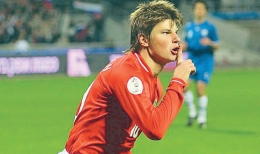Having topped their European Championship qualifying group for the first time in five attempts, Russia will have great expectations going into this summer’s showpiece event in Poland and Ukraine.
The dream will be to surpass the achievements of four years ago, when they made it to the semi-finals only to lose to eventual winners Spain. The campaign in Austria and Switzerland surely also provides fond memories for Russia’s legion of fans as it was the first time they went beyond the group stage at the Euro Cup finals.
Yet despite their successes in the last European campaign, Russia failed to qualify for the World Cup in South, Africa thus prompting the departure of then coach Guus Hiddink. In came Dick Advocaat, and after an indifferent start in his new role, the Dutchman went on to guide Russia to the top of their qualifying group and above the Republic of Ireland.
Advocaat arrived in Russia with a wealth of international experience, having coached the Netherlands, United Arab Emirates, South Korea and Belgium, but he thinks his spell with Zenit St Petersburg was the reason for his latest appointment two years ago this month.
“It was a good move to take me after [Guus] Hiddink because I already had worked there (for us) and I knew all the players well,” he said. “If they really had started all over again and had to make a new selection it would have become very difficult.
“But I just built on the group of CSKA [Moscow] players and a group of Zenit players. Both teams were doing well and are doing well and it has proved to be the right view.”
Russia will enter the finals in Poland and Ukraine with the appearance of a well-organised defence that conceded just four goals during the qualifying campaign. This creditable record is adeptly balanced with the attacking strengths of Alan Dzagoev and Roman Pavlyuchenko, who scored four goals each during the qualifiers, and the obvious potential of captain Andrey Arshavin.
The Arsenal player, currently on loan with Zenit St Petersburg, has struggled to find his best form at club level but has been ever present with the national team, playing in all 10 qualifiers.
Another to have played in all the qualifiers is versatile defender Vasili Berezutski of CSKA Moscow, while his team-mate in the backline, Sergei Ignashevich, will go to the finals as Russia’s most capped player in the current squad.
Since the break up of the USSR in December 1991, Russian soccer has failed to live up to expectations. At Euro ’92 in Sweden, a temporary association called the Commonwealth of Independent States – formed by 12 of the 15 newly formed sovereign states – finished bottom of their group after a dismal 3-0 defeat to Scotland in what was the last game for the former Soviet bloc.
Russia, which Fifa has accredited with all previous results by the Soviet Union, qualified for the finals in 1996 and 2004 but disappointing tournaments resulted in them finishing bottom of their group on each occasion.
Prior to the break-up of the USSR, the Soviet Union almost ended the history book as they begun. The Soviets won the inaugural European Champion-ships, held in France in 1960, beating Yugoslavia 2-1 in the final with Viktor Ponedelnik scoring the winner in extra-time. The Soviets finished runner-up at the ’64 and ’72 finals, losing to Spain and West Germany respectively. And under extraordinary circumstances in 1968, after their semi-final draw with Italy, to avoid a replay they tossed a coin to see who would progress to the final. The Soviet Union lost the toss and Italy went on to win the European Champion-ships.
Their defeat in the 1972 final in Belgium would surprisingly be their last match at European soccer’s main event until the 1988 tournament held in West Germany. But for a third time they just fell short of the line, losing 2-0 in the final to the Netherlands.
The 1988 tournament is particularly interesting for the Ukrainian population as 22 of the 24 squad members were from their lands. Indeed, the coach and 11 of the squad were part of a Dynamo Kiev team that were a major force in European club soccer at the time.
It is worth noting that when Russia finished bottom of their group at both the ’96 and ’04 tournaments, the two teams that contested the final both advanced from Russia’s group: the Czech Republic and Germany in 1996, and Portugal and Greece in 2004. Russia beat eventual champions Greece 2-1 in their final group match, but qualification to the quarter-finals was already beyond their reach.
During eight of their previous nine appearances at the European Championship finals, the Russians were either beaten or eliminated by the eventual winners – 1992 winners Denmark being the only exception. Russia will again meet the Czech Republic (on 8 June) and Greece (on 16 June) in this year’s tournament, with a date with co-hosts Poland (12 June) sandwiched in between.












